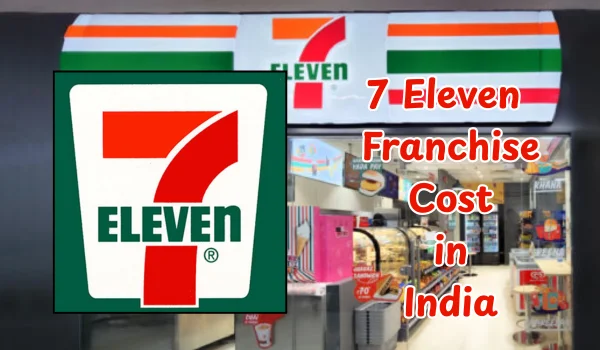India’s retail sector is booming, driven by urbanization, changing consumer preferences, and increasing disposable incomes. Convenience stores are becoming a crucial part of the retail landscape, offering quick access to daily essentials, ready-to-eat food, and various services. Among the global leaders in the convenience store segment is 7-Eleven, the world’s largest convenience retail chain.
Founded in 1927, 7-Eleven operates over 83,000 stores across 19 countries. Known for its iconic Slurpee drinks, ready-to-eat meals, and 24/7 operations, 7-Eleven has become synonymous with convenience retailing. The brand’s entry into India represents a significant opportunity for entrepreneurs interested in the retail sector.
This article provides a comprehensive overview of the 7-Eleven franchise cost in India, covering investment requirements, profitability prospects, eligibility criteria, and the application process.
7-Eleven Franchise Cost in India: Investment Breakdown

The cost of owning a 7-Eleven franchise in India depends on factors such as location, store size, and operational model. Based on global franchising models and industry estimates, the initial investment typically ranges between ₹50 lakh to ₹1.5 crore. Here’s a detailed breakdown:
1. Franchise Fee:
- The one-time franchise fee for a 7-Eleven store in India is estimated to be between ₹15 lakh to ₹25 lakh, depending on the location and store format.
- This fee provides franchisees with the rights to operate under the 7-Eleven brand and access proprietary operational systems.
2. Store Setup and Interiors:
- 7-Eleven stores are known for their compact layouts, self-service kiosks, and efficient designs.
- The setup cost, including store construction, interiors, fixtures, and branding, typically ranges from ₹30 lakh to ₹80 lakh, depending on the store size (1,000–2,000 sq. ft.).
3. Inventory and Stocking:
- Initial procurement of inventory, including groceries, snacks, beverages, and personal care items, requires an investment of ₹10 lakh to ₹20 lakh.
4. Working Capital:
- Franchisees should allocate ₹10 lakh to ₹15 lakh for operational expenses, including staff salaries, utilities, and inventory replenishment.
5. Royalty and Marketing Fees:
- 7-Eleven typically charges a royalty fee of 5% to 7% of gross sales, covering brand support and operational assistance.
- An additional 1% to 2% of gross sales is allocated for marketing and promotional campaigns.
Why Invest in a 7-Eleven Franchise in India?
7-Eleven’s entry into India has been well-timed, aligning with the country’s growing demand for organized retail and convenience stores. Here’s why investing in a 7-Eleven franchise is a promising opportunity:
Strong Global Brand Recognition:
- 7-Eleven is the world’s largest convenience store chain, ensuring brand trust and customer loyalty.
Growing Convenience Store Market:
- India’s convenience store market is projected to grow at a CAGR of 17%, driven by urbanization, busy lifestyles, and increasing demand for quick shopping solutions.
24/7 Operational Model:
- 7-Eleven’s 24-hour operations cater to the needs of modern consumers seeking round-the-clock access to groceries, snacks, and essential services.
Diverse Product Offering:
- The brand offers a wide range of products, including fresh food, beverages, personal care products, and ready-to-eat meals, appealing to a broad customer base.
Proven Business Model:
- With decades of operational experience, 7-Eleven provides a robust franchise model, offering training, marketing support, and supply chain management.
7-Eleven’s Entry and Expansion Strategy in India
7-Eleven made its entry into India through a master franchise agreement with Reliance Retail, India’s largest retail chain. The first 7-Eleven store in India opened in Mumbai in October 2021. Reliance Retail aims to expand the brand aggressively across major Indian cities, offering a new retail experience that includes grab-and-go food options, affordable pricing, and global product offerings.
While 7-Eleven in India is currently operated by Reliance Retail, there are future opportunities for sub-franchising, which would allow individual entrepreneurs to own and operate 7-Eleven outlets under Reliance’s guidance.
Eligibility Criteria for Owning a 7-Eleven Franchise in India
Given the brand’s premium positioning and operational standards, 7-Eleven follows a stringent selection process for franchise partners. The key eligibility criteria include:
Financial Strength:
- Prospective franchisees must have a net worth of at least ₹2 crore and the ability to invest ₹50 lakh to ₹1.5 crore.
Retail Experience:
- While prior experience in retail management is preferred, it is not mandatory. Strong business acumen and operational expertise are essential.
Prime Location:
- The proposed store location should be in high-footfall areas, such as residential neighborhoods, near transportation hubs, business districts, and college campuses.
Operational Commitment:
- Franchisees must be actively involved in the daily operations of the store to ensure brand consistency and customer satisfaction.
Steps to Apply for a 7-Eleven Franchise in India
If you meet the eligibility criteria, follow these steps to apply for a 7-Eleven franchise in India:
Step 1: Franchise Application
- Visit the Reliance Retail official website or 7-Eleven’s global franchise portal to submit a franchise inquiry.
- Provide details about your financial background, preferred location, and business experience.
Step 2: Screening and Evaluation Process
- The franchise team reviews applications and conducts interviews to assess financial capability, business acumen, and operational readiness.
Step 3: Location Assessment and Approval
- The proposed location undergoes a feasibility study, considering customer demographics, market potential, and competition.
Step 4: Franchise Agreement Signing
- Upon approval, franchisees sign a detailed franchise agreement covering operational responsibilities, revenue-sharing terms, and brand compliance requirements.
Step 5: Store Setup and Training
- Franchisees receive comprehensive training on store management, customer service, inventory management, and sales techniques.
- The store is set up following 7-Eleven’s global operational standards.
Step 6: Store Launch
- The store is launched with marketing and promotional support from Reliance Retail and 7-Eleven, ensuring high visibility and customer footfall from day one.
Profitability and Return on Investment (ROI)
A 7-Eleven franchise in India offers attractive profitability prospects due to its global brand recognition and customer-centric operational model. Here’s an overview of potential returns:
- Annual Revenue: ₹2 crore – ₹5 crore, depending on location and store performance.
- Net Profit Margins: 10% – 15%, depending on operational efficiency and sales volume.
- Break-even Period: 2 to 3 years, depending on store performance, location, and operational management.
Challenges of Owning a 7-Eleven Franchise in India
While owning a 7-Eleven franchise offers significant returns, potential franchisees should consider the following challenges:
High Initial Investment:
- The capital requirement can be a barrier for small investors, especially in prime urban locations.
Operational Complexity:
- Managing a convenience store requires expertise in supply chain management, customer service, and staff management.
Location Sensitivity:
- The success of a 7-Eleven store heavily depends on its location. Poor site selection can significantly impact sales and profitability.
Competition from Local Retailers:
- The convenience store market in India is highly competitive, with both local kirana stores and organized retail chains vying for market share.
Conclusion
Investing in a 7-Eleven franchise in India offers a lucrative opportunity for entrepreneurs with the financial resources and operational expertise required to manage a convenience retail business. With its strong global brand presence, diverse product offerings, and growing customer base, 7-Eleven provides a sustainable and profitable business model in India’s dynamic retail market.
The 7-Eleven franchise cost in India ranges from ₹50 lakh to ₹1.5 crore, depending on factors such as store size, location, and operational requirements. While the initial investment is substantial, the brand’s high-profit margins, robust support system, and rising demand for convenience retail make it a worthwhile venture.
For entrepreneurs ready to meet 7-Eleven’s operational standards and committed to delivering exceptional customer experiences, owning a 7-Eleven franchise could be the gateway to long-term profitability and success in India’s fast-evolving retail landscape.

Shashi Kant is the Founder and Editor of BusinessScroller.com, a leading platform for business insights, finance trends, and industry analysis. With a passion for journalism and expertise in business reporting, he curates well-researched content on market strategies, startups, and corporate success stories. His vision is to provide valuable information that empowers entrepreneurs and professionals. Under his leadership, BusinessScroller.com has grown into a trusted source for in-depth articles, customer care guides, and financial expertise.



Need Detail about 7-Eleven franchisee
I m looking forward for this franchise
Want to open seven eleven
Want to open 7 Eleven frenchise in India, Gujarst, City Ahmedabad
I want start new franchise
SEND DETAILS IN 7 ELEVEN OPEN IN GUJRAT SURAT 9429072816 WHATTS UP
I want also open the 7 Eleven Store in panchkula